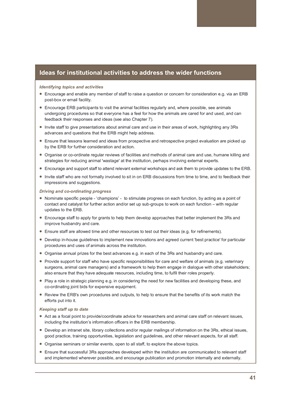
41
Ideas for institutional activities to address the wider functions
Identifying topics and activities
Encourage and enable any member of staff to raise a question or concern for consideration e.g. via an ERB
post-box or email facility.
Encourage ERB participants to visit the animal facilities regularly and, where possible, see animals
undergoing procedures so that everyone has a feel for how the animals are cared for and used, and can
feedback their responses and ideas (see also Chapter 7).
Invite staff to give presentations about animal care and use in their areas of work, highlighting any 3Rs
advances and questions that the ERB might help address.
Ensure that lessons learned and ideas from prospective and retrospective project evaluation are picked up
by the ERB for further consideration and action.
Organise or co-ordinate regular reviews of facilities and methods of animal care and use, humane killing and
strategies for reducing animal 'wastage' at the institution, perhaps involving external experts.
Encourage and support staff to attend relevant external workshops and ask them to provide updates to the ERB.
Invite staff who are not formally involved to sit in on ERB discussions from time to time, and to feedback their
impressions and suggestions.
Driving and co-ordinating progress
Nominate specific people - "champions" - to stimulate progress on each function, by acting as a point of
contact and catalyst for further action and/or set up sub-groups to work on each function - with regular
updates to the ERB.
Encourage staff to apply for grants to help them develop approaches that better implement the 3Rs and
improve husbandry and care.
Ensure staff are allowed time and other resources to test out their ideas (e.g. for refinements).
Develop in-house guidelines to implement new innovations and agreed current 'best practice' for particular
procedures and uses of animals across the institution.
Organise annual prizes for the best advances e.g. in each of the 3Rs and husbandry and care.
Provide support for staff who have specific responsibilities for care and welfare of animals (e.g. veterinary
surgeons, animal care managers) and a framework to help them engage in dialogue with other stakeholders;
also ensure that they have adequate resources, including time, to fulfil their roles properly.
Play a role in strategic planning e.g. in considering the need for new facilities and developing these, and
co-ordinating joint bids for expensive equipment.
Review the ERB's own procedures and outputs, to help to ensure that the benefits of its work match the
efforts put into it.
Keeping staff up to date
Act as a focal point to provide/coordinate advice for researchers and animal care staff on relevant issues,
including the institution"s information officers in the ERB membership.
Develop an intranet site, library collections and/or regular mailings of information on the 3Rs, ethical issues,
good practice, training opportunities, legislation and guidelines, and other relevant aspects, for all staff.
Organise seminars or similar events, open to all staff, to explore the above topics.
Ensure that successful 3Rs approaches developed within the institution are communicated to relevant staff
and implemented wherever possible, and encourage publication and promotion internally and externally.